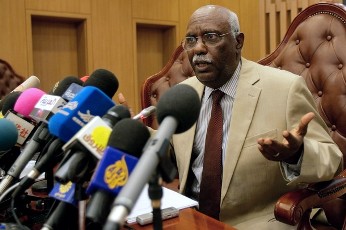Sudan conditions pullout of Abyei on forming administrative body
May 14, 2012 (KHARTOUM) – The Sudanese government has conditioned withdrawal of its troops from Abyei on the formation of an administrative body as agreed with South Sudan last year, warning that otherwise a vacuum would be created in the hotly-contested region.

The move followed a UN Security Council’s resolution ordering the two countries to withdraw troops from disputed border regions and resume negotiations on post-secession issues with a three-month deadline to conclude them.
But the Sudanese minister of foreign affairs, Ali Karti, informed the special envoy of the UN’s secretary-general to Sudan, Haile Menkerios, in a meeting held on Sunday at the headquarters of the foreign ministry in Khartoum that withdrawal of the Sudanese Armed Forces (SAF) without there being any administrative structures in the area would create a vacuum.
Sudan was supposed to withdraw troops from the area it took by force in May last year following an agreement signed a month later between Khartoum and Juba in the Ethiopian capital Addis Ababa.
Addis Ababa deal, formally known as Temporary Arrangements for the Administration and Security of the Abyei Area, provided for the immediate withdrawal of troops from the region and the formation of a joint administrative body headed by a representative of South Sudan and a legislative body headed by a representative of Sudan.
The deal also stipulated the deployment of a UN peacekeeping force composed of 4,200 Ethiopian troops known as UNISFA to take charge of security in the volatile region until a final settlement can be reached.
As expected, however, both Khartoum and Juba failed to uphold their commitment and the area remained under SAF control and without an administration body.
For his part, Menkerios informed Karti that he intends to present his regular report on the situation between the two countries to the UNSC in mid-May.
Sudan’s top diplomat urged the UNSC and other regional bodies to address the root causes of the crisis between his country and South Sudan.
Karti pinned the blame firmly on Juba for the current situation in Abyei, saying that the latter had refused to form a joint administration.
Talks to form an administration body as stipulated under the deal collapsed in December last year after South Sudan insisted that SAF withdraws troops first.
More details on Khartoum’s conditions for withdrawal from Abyei came from the undersecretary of the Sudanese foreign ministry, Rahmt Allah Mohamed Osman, who insisted that Sudan will not withdraw unless UNISFA’s deployment is complete, an administration is formed and an investigation committee is established to verify the implementation of Addis Ababa deal.
The Sudanese diplomat charged that South Sudan withdrawal was merely an attempt to score political points against Khartoum.
“This is a political maneuver. Juba wants to embarrass Khartoum in front of the international community,” Osman said.
Abyei status was meant to be determined through a referendum originally planned to take place at the same time as that of South Sudan on independence in January last year.
The vote however stalled after both sides failed to agree on who has the right to vote, with Juba refusing Khartoum’s demands that the the cattle-herding nomads of Al-Messiryah be allowed to vote alongside the area’s indigenous population of Dinka Ngok.
(ST)
